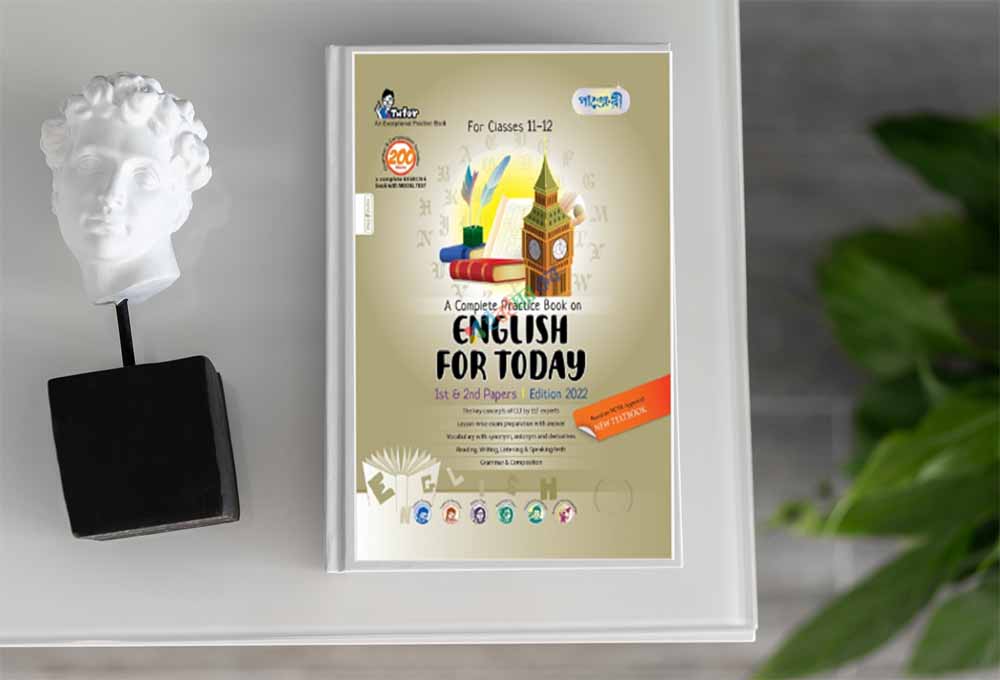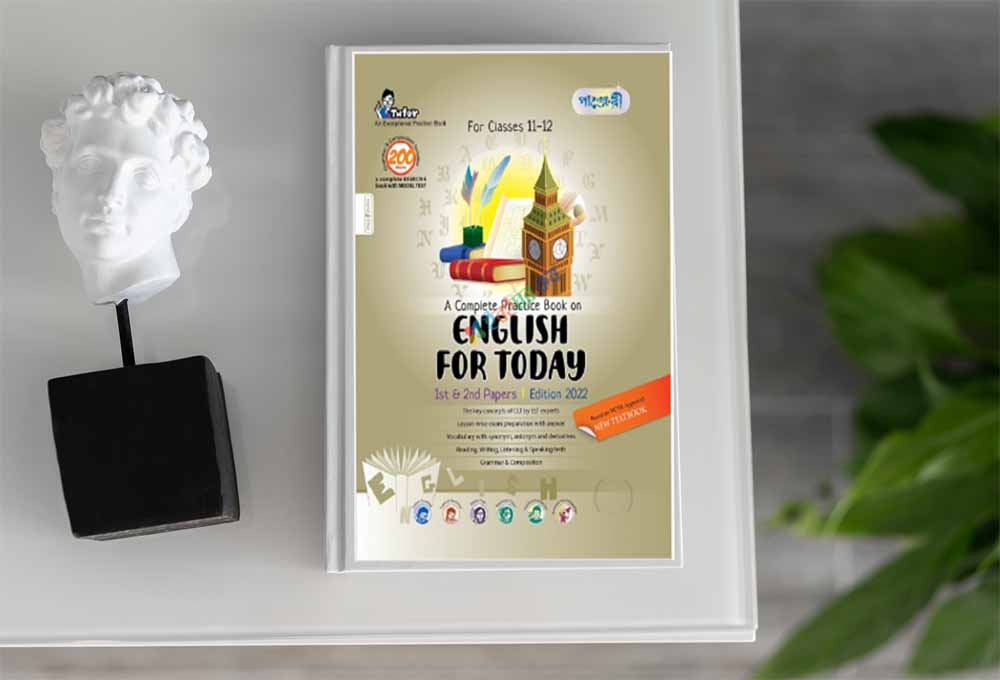HSC English1st paper model question with answer pdf-01
Solution to Model Question–01
1.A. (a) (i) impartiality (b) (iii) F.W.de Klerk (c) (ii) pleader (d) (iv) nearly 30 years (e) (ii) Racial discrimination was abolished (f) (i) embody (g) (iii) inhabited (h) (ii) refrained (i) (iii) discrimination (j) (ii) Mandela won Nobel Prize after he became president (k) (iv) dominated (l) (iv) gap (m) (ii) bond (n) (iii) appeasement (o) (i) abolish (p) (iv) end of a long struggle for political rights (q) (iv) Political freedom (r) (iv) discrimination (s) (iv) focal point (t) (iv) all of the above answers (u) (iv) autocracy
- আরো পড়ুন: HSC English1st paper model question with answer pdf-01
- আরো পড়ুন: HSC English1st paper model question with answer pdf-02
- আরো পড়ুন: HSC English1st paper model question with answer pdf-03
- আরো পড়ুন: HSC English1st paper model question with answer pdf-04
- আরো পড়ুন: HSC English1st paper model question with answer pdf-05
- (a) Apartheid is a political situation in which people of different races are separated. I don’t support apartheid because apartheid destroys the unity and harmony of a society and brings out civil war.
(b) Mandela’s words that inspire me most are that “I have cherished the ideal of a democratic and free society in which all persons live together in harmony and with equal opportunities. It is an ideal I hope to live for and to achieve. But if need be, it is an ideal for which I am prepared to die.”
(c) Mandela was awarded Nobel Peace Prize for keeping peace in South Africa as well as in the whole world by fighting against apartheid.
(d) Democracy is the belief in freedom and equality, between people, or a system of government based on this belief, in which power is either held by elected representatives or directly by the people themselves. The people of the democratic world remember Mandela with honour and respect.
(e) The significance and importance of 1993, 1994 & 2004 is that in 1993 Nelson Mandela was awarded The Nobel Peace Prize, in 1994 Mandela became the first black President of South Africa and in 2004 Mandela left public life.
(f) Nelson Mandela is the most celebrated and undisputed Black African leader. He is famous for his life long struggle against apartheid to free the black people from the racial discrimination of the white people.
(g) He became the first Black President of South Africa in 1994. In his inaugural speech after accepting Presidency he said, “The time for the healing of the wounds has come. The moment to bridge the chasms that divide us has come. We have, at last, achieved our political emancipation.”
(h) Nelson Mandela’s dream was to gain freedom for the Black Africans of South Africa and to achieve political emancipation for them. He fought for the Black South Africans to bring down racial discrimination by avoiding a civil war through a non-violent movement.
(i) Throughout his life, Nelson Mandela struggled for the emancipation of black people. But during this time he was non-violent and avoided civil war. So the author says Nelson Mandela an icon of peace.
(j) Mandela was imprisoned for nearly 30 years. His determination was to bring down apartheid and the emancipation of black people from the domination of white minority.
(k) This sentence clarifies the bringing down of apartheid. Apartheid had created a big chasm between the black and the white in South Africa. But with the struggle of Mandela and his becoming President of South Africa there’s created a bridge to unite the South Africans.
(l) Mandela played a prominent role on the world stage as an advocate of human dignity in the face of challenges ranging from political repression to AIDS.
(m) Mandela was imprisoned for nearly three decades. But undergoing such a suffering, he never lost his resolve to fight for his people’s emancipation and to bring down apartheid. Thus for his sacrifice, patience and non-violent attitude, he won the support of the world.
(n) The sentence indicates the successful end of a long struggle for achieving political rights of the black people of South Africa.
(o) Nelson Mandela was imprisoned for his undaunted determination to free the black Africans from the shackles of the white minority rule and to gain political emancipation. He remained in prison for nearly three decades.
(p) He was well known throughout the world as an icon of peace and reconciliation because of his indomitable courage to fight against the white minority rule and free the black Africans from racial discrimination.
hsc-english1st-paper-model-question-with-answer-pdf-01
- আরো পড়ুন: HSC English First Paper Barishal Board Questions and Answers
- আরো পড়ুন: HSC English First Paper Chattogram Board Questions and Answers
- আরো পড়ুন: HSC English First Paper Cumilla Board Questions and Answers
- আরো পড়ুন: HSC English First Paper Dhaka Board Questions and Answers
- আরো পড়ুন: HSC English First Paper Jashore Board Questions and Answers
- আরো পড়ুন: HSC English First Paper Rajshahi Board Questions and Answers
- আরো পড়ুন:HSC English First Paper Sylhet Board Questions and Answers
- A flow chart showing the activities and achievements of Nelson Mandela is given below :
| 1. Guiding the South Africans against racial discrimination | ® | 2. Fighting for emancipation | ® | 3. Determined to bring down apartheid | ® | 4. Becoming the first black President of South Africa | ® | 5. Winning the Nobel Peace Prize | ® | 6. Becoming world’s most revered public figure |
Or, (i) fighting against apartheid (ii) Nelson Mandela (iii) Africa’s first black President (iv) receive (v) 1993 (vi) Nelson Mandela (vii) for three decades (viii) Nadine Gordimer (ix) Mandela (x) June 2004
- Nelson Mandela was the most celebrated and undisputed Black African leader. He is famous for his life-long struggle against racial discrimination. He dreamt of gaining freedom for the black people of South Africa and to achieve political emancipation for them. He fought for the black South Africans to bring down apartheid through non-violent movement by avoiding a civil war. He lived behind bars for nearly three decades. He was awarded the Nobel Peace Prize in 1993. He became the first black president of South Africa in 1994. He formally left public life before his 86th birthday in 2004.
উক্ত বিষয় সম্পর্কে কিছু জানার থাকলে কমেন্ট করতে পারেন।
আমাদের সাথে ইউটিউব চ্যানেলে যুক্ত হতে এখানে ক্লিক করুন এবং আমাদের সাথে ফেইজবুক পেইজে যুক্ত হতে এখানে ক্লিক করুন। গুরুত্বপূর্ণ আপডেট ও তথ্য পেতে আমাদের ওয়েবসাইটে ভিজিট করুন।











